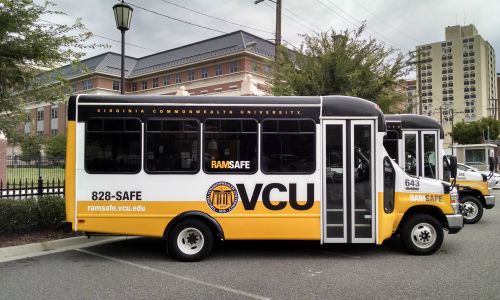Virginia Commonwealth University (VCU) Parking and Transportation has retrofitted seven shuttle buses in its 10-vehicle RamSafe fleet with bi-fuel propane autogas systems. According to an announcement, the conversion is projected to save the division more than $20,000 in annual fuel costs.
The project was made possible through a partnership with the Virginia Department of General Services; the Virginia Department of Mines, Minerals and Energy; Alliance AutoGas; and Virginia Clean Cities.
RamSafe is a point-to-point evening transportation service for students, faculty and staff 365 days per year. Service is offered within defined boundaries on the Monroe Park and MCV campuses, with the majority of the requested trips traveling to and from university-owned buildings and residential housing. Annually, the RamSafe fleet travels approximately 150,000 miles.
The announcement says this autogas conversion marks the first significant step VCU Parking and Transportation has taken in efforts to operate a more sustainable fleet. It puts the university one step closer to its goal of reducing its greenhouse gas emissions to 30% below business-as-usual emissions by 2025.
“The decision to invest in a more sustainable fleet simply made a lot of sense,” says Craig Willingham, fleet manager at VCU. “VCU is a great setting to support alternate fuel usage. In addition to promoting a safer environment and cleaner-burning fuels within the vehicle fleet, there are opportunities for cost savings.”
The requisition for the conversion was completed through a state contract with Alliance AutoGas, which also serves as the official propane provider.
“As the country’s leading autogas conversion provider, Alliance AutoGas is honored to be part of VCU’s launch into alternative fuels,” says Ed Hoffman, president of Blossman Services Inc., equipment supplier for Alliance AutoGas. “Our turnkey solution will enable VCU to improve its carbon footprint with clean and domestic propane autogas.”
Virginia Clean Cities, which assists in the improvement of the commonwealth’s air quality through the promotion of alternative fuel, also worked with VCU Parking and Transportation to identify incentives as part of the overall state transition to alternative fuel.
“Virginia Clean Cities is proud of VCU’s efforts with these new, clean-fuel vehicles,” says Alleyn Harned, executive director. “These conversions let us use a cleaner domestic fuel and reduce air pollution while improving our energy and economic security.”
VCU’s Willingham notes that these conversions mark just the beginning of the many opportunities to expand alternative fuel usage at VCU. Ultimately, the division looks to increase the number of alternative fuel vehicles across the entire fleet.
Reimbursement for conversion costs will be provided through a Congestion Mitigation and Air Quality grant offered by the Virginia Department of Mines, Minerals and Energy.
Source: NGTnews.com
